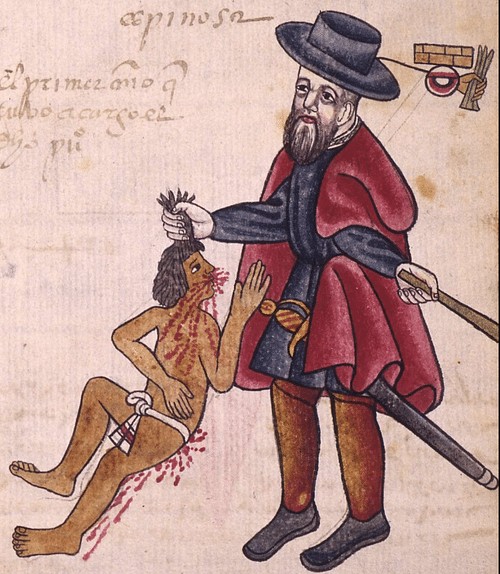441. Lambs to the Slaughter: Debating the New World
Bartholomé De las Casas argues against opponents, like Sepúlveda, who believed that Europeans had a legal and moral right to rule over and exploit the indigenous peoples of the Americas.
Themes:
• N. Griffin (trans.), Bartolomé de las Casas: A Short Account of the Destruction of the Indies (Penguin: 1992).
• D.M. Lantingua and L.A. Clayton (trans.), Bartolomé de las Casas and the Defense of Amerindian rights : a Brief History with Documents (Tuscaloosa: 2020).
• G. Sanderlin, Bartolomé de las Casas: A Selection of His Writings (New York: 1971).
---
• E. Andujar, “Bartolomé de las Casas and Juan Ginés de Sepúlveda: Moral Theology versus Political Philosophy,” in K. White (ed.), Hispanic Philosophy in the Age of Discovery (Washington DC: 1997), 69-87.
• M. Beuchot, Los fundamentos de los derechos humanos en Bartolomé de las Casas (Barcelona: 1994).
• D.R. Brunstetter, “Sepúlveda, Las Casas, and the Other: Exploring the Tension between Moral Universalism and Alterity,” Review of Politics 72 (2010), 409-35.
• D. Castro, Another Face of Empire: Bartolomé de Las Casas, Indigenous Rights, and Ecclesiastical Imperialism (Durham NC: 2007).
• L.A. Clayton, Bartolomé de las Casas and the Conquest of the Americas (Chichester: 2011).
• L.A. Clayton, Bartolomé de las Casas: a Biography (Cambridge: 2012).
• S. Davis, “Humanist Ethics and Political Justice: Soto, Sepúlveda, and the ‘Affair of the Indies’,” Annual of the Society of Christian Ethics 19 (1999), 193-212.
• J. Friede and B. Keen (eds), Bartolomé de las Casas in History: Toward an Understanding of the Man and His Work (DeKalb: 1971).
• A. Gerbi, The Dispute of the New World: The History of a Polemic, 1750-1900 (Pittsburgh: 1973).
L. Hanke, Bartolomé de las Casas: an Interpretation of his Life and Writings (The Hague: 1951).
• L. Hanke, Aristotle and the American Indians: a Study of Race Prejudice in the Modern World (Bloomington: 1959).
• L. Hanke, All Mankind Is One: a Study of the Disputation Between Bartolomé De Las Casas and Juan Ginés De Sepúlveda in 1550 on the Intellectual and Religious Capacity of the American Indians (De Kalb: 1994).
• G. L. Huxley, “Aristotle, Las Casas and the American Indians,” Proceedings of the Royal Irish Academy 80 (1980), 57-68.
• D.T. Orique and R. Roldán-Figueroa (eds), Bartolomé de las Casas, O.P.: History, Philosophy, and Theology in the Age of European Expansion (Brill: 2018).
• A. Pagden, “The ‘School of Salamanca’ and the ‘Affair of the Indies’,” History of Universities 1 (1981), 71-112.
• A. Pagden, The Fall of Natural Man: the American Indian and the Origins of Comparative Ethnology (Cambridge: 1982).
• K.J. Pennington, Jr., “Bartolome de Las Casas and the Tradition of Medieval Law,” Church History 39 (1970), 149-61.
• S. Poole, Bartolomé de las Casas: In Defense of the Indians (DeKalb: 1974).
• T. Todorov, The Conquest of America: the Question of the Other, trans. R. Howard (New York: 1984)
• X. Tubau, “Canon Law in Juan Ginés de Sepúlveda’s Democrates Secundus,” Bibliothèque d'Humanisme et Renaissance 73 (2011), 265-77.
• D. von Vacano, “Las Casas and the Birth of Race,” History of Political Thought 33 (2012), 401-26.
Online bibliography on the encounter with the Americas: www.lascasas.org






Comments
Italy + Iberian +Russian philosophy 17th/18th century
Professor have you thought about covering Italy alongside Iberian Peninsular philosophers in a combined short series for the 17th/18th century alongside Russian Philosophy?
I believe having these 3 combined in 1 book is more ideal, as Italian/Iberian philosophy makes thematic sense to be combined with France (Catholic heritage) and Low Countries (Holland fighting wars of independence from Spanish Habsburgs) but the content might get too bloated, as Iberian + Italian might take around the same size as your coverage of Byzantine philosophy and having that size alongside covering Spinoza/Grotius/Descartes/Cartesians/Bayle/Montesquieu/Rousseau, Christiaan Huygens (scientific revolution) will be fine in a podcast format but when you are putting them in to a OUP volume might get bloated (and you might have to split that book in half).
Russian Philosophy (Orthodox Heritage) initially you wanted to incorporate that with German Philosophy (17th/18th) but wouldn't it better to mix Russian Philosophy alongside Iberian + Italian (Catholic heritage) as I don't see Russian Philosophy taking up much content in this period and you can have a short volume of these 3 geographical regions in 1 book.
So your 17th/18th century coverage will look like...
1. France + Low Countries
2. Britain, Ireland and Early US
3. German Philosophy (+ Central Europe)
4. Iberian + Italian + Russian Philosophy (short work)
In reply to Italy + Iberian +Russian philosophy 17th/18th century by dukeofethereal
Fourth volume
Hm, that's interesting. No I hadn't thought about that. Iberia & Italy certainly makes sense. Wouldn't Russia feel like a bit of an interloper there though? Not so much in the podcast, where a shorter series would be fine, I am more worried about the book series. But it is definitely worth considering, thanks!
In reply to Fourth volume by Peter Adamson
Russia as an interloper
On a second though, thematically Russia would make more sense to be combined with German philosophy given many German intellectuals would be invited by the Russian Tsar in the 18th/19th century and the influence of Leibniz, Kant, Schelling and Hegel on Russian philosophy/culture.
If you don't want to consider making a 4th series, just combine Iberian/Italy with France/Low Countries. I sent you a list of philosophers of 17th-18th century Italian Philosophers some time ago on this website.
In reply to Russia as an interloper by dukeofethereal
Russia
Yes that was my thought too about going well with Germany. And yes thanks, I still have your list!
Add new comment